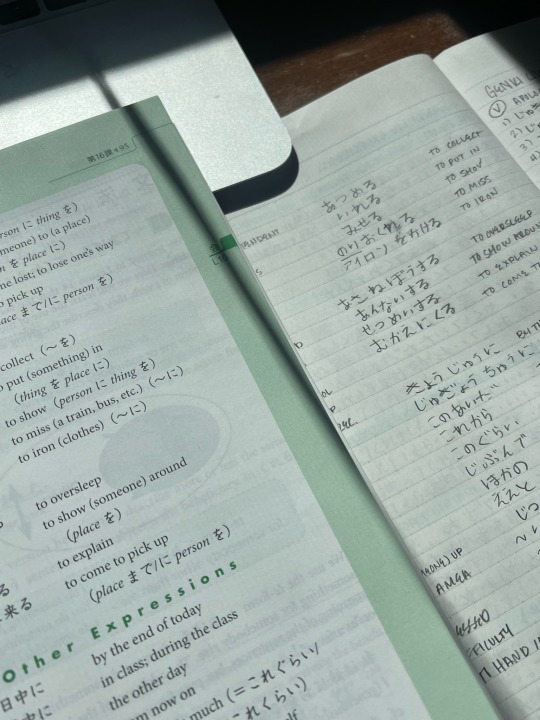#n4 kanji
Text
N4 文法: はずがない
はずがない= cannot be (its impossible)
How to use:
verb stays in dictionary form + はずがない
For な-adjective you な before the はずがない, for nouns you add の before.
Examples:
彼はそなことを言うはずがない- he would never say that
そんなはずがない。- That cannot be true
彼女の話は本当のはずがない- her story cannot be true
そな大きな量を全部食べられるはずがない- there's no way you can eat that whole portion
#japanese#language learning#studyblr#日本語#japan#langblr#nihongo#learn japanese#study kanji#learn kanji#japanese grammar#jlpt n4
93 notes
·
View notes
Text


when am i not studying ☕️🏹🏛️
#studyblr#study blog#langblr#langblog#japanese langblr#japanese language#japanese#studyinspo#study motivation#study aesthetic#jlpt n3#jlpt#jlpt n5#jlpt n4#japanese kanji#studystudystudy#exam study#study buddy#study hard#study#study notes#study space#coffee aesthetic#coffee order
86 notes
·
View notes
Text
Soon(tm)

#senchastudying#learning japanese#fountain pen#jlpt#jlpt n5#日本語#japanese#kanji#jlpt n4#studyblr#Tea#お茶
22 notes
·
View notes
Text
What should I use after Genki? Books I used for N5 + N4
youtube
English sub included ⭐
#japanese#kanji#japanese language#learning japanese#japanese langblr#Jlpt#jlpt n5#jlpt n4#にほんごべんきょう#にほんご#nihongo#japanese book#learn japanese#japanese grammar#japanese vocabulary#Youtube
15 notes
·
View notes
Text
Kanji of the day: 死
死 - Death, die
Kun: し.ぬ、し.に-
On: シ
(Pinyin: sǐ | si3 )
Pictographic: A carcass 歹 with a person 人 kneeling next to it

(死 as it appeared in bronze script during the Early Western Zhou dynasty, ~1000BC)
Strokes: 6
Radical: 歹 death
19 notes
·
View notes
Text
yeah i’m seriously thinking of applying for jlpt n4
#i just think n5 won't encourage me to push myself whereas n4 will#it only tests receptive skills anyway#if it tested productive skills too i'd be a bit more hesitant#but receptive skills is easy. just gotta learn the vocab and the grammar and the kanji readings#don't have to worry about producing comprehensive sentences
37 notes
·
View notes
Text
JLPT N4 例文で分かる漢字「前」
音読み:ゼン
訓読み:まえ
前後(ぜんご) before and after
以前(いぜん) Before
直前(ちょくぜん) Immediately before
名前(なまえ) Name
前回(ぜんかい) Previous
前期(ぜんき) Previous period
午前(ごぜん) Morning
午前中(ごぜんちゅう) In the morning
例文:
新製品(しんせいひん)の価格(かかく)は3万円前後(まんえんぜんご)���なる予定(よてい)だ。The price of the new product will be around 30,000 yen.
今(いま)は汚(きたな)いこの川(かわ)も、以前(いぜん)は泳(およ)げるきれいな川(かわ)でした。This river, which is dirty now, used to be clean…

View On WordPress
6 notes
·
View notes
Text
youtube
JLPT N4 Kanji Lesson #6: 家 (ka)
#japanese#learn japanese#nihongo#nihon#japan#jlpt n4#jlpt n4 kanji#japanese kanji#video#jlpt#Youtube
12 notes
·
View notes
Text
i've been so consistent with japanese for the past 2 months and i know i'm making progress but at the same time whenever i see a kanji i can't read i'm like. it is impossible for me to ever learn japanese i can't understand ANYTHING and i will literally never get better it is embarrassing and i should just stop etc.
#i always focused on the vocab and kanji instead of grammar bc that's how i learned english lmao#i mean by reading/listening and not really understanding the rules#but this year i wanted to focus on the basics so even though my kanji level is somewhere between n4 and n3#i went through the entire n5 coursebook i bought like... 15 years ago omg and i made sure i understand and remember all the grammar rules#and then moved onto n4 grammar coursebook#and honestly i am blown away agkdgjsjd so many things i've known instinctively started making sense#and i noticed i learn faster#bc i already have the words and i am used to the language so applying the rules is easier#so uhhhh fucking around for 10 years instead of diligently studying wasn't entirely a waste of time ig????#but of course i'm starting to get impatient sgjsfjsj i need to buy n3 coursebook soon and then the real fun will start#k.txt#for the past year i've really been living the naruto way. believe-iting my way through shit
7 notes
·
View notes
Text
Studying Abroad and its benefits

Typically, studying abroad involves enrolling in a specific program or exchange that allows students to attend classes, participate in research projects, or engage in internships or cultural immersion activities. These programs can vary in duration, ranging from a few weeks to a full academic year or longer. Students may choose to study abroad for a single semester, an entire academic year, or for shorter summer or winter sessions.
Studying abroad provides several benefits, including:
1. Cultural Immersion: It allows students to fully immerse themselves in a different culture, experiencing the customs, traditions, and daily life of the host country. This firsthand exposure enhances cultural understanding and promotes personal growth.
2. Academic Enrichment: Studying abroad often provides access to high-quality educational institutions and programs that may offer unique courses, research opportunities, or specialized fields of study. Students can broaden their academic perspectives and gain a global outlook on their chosen field.
3. Language Acquisition: Studying abroad provides an ideal environment for learning or improving a foreign language. Being surrounded by native speakers and using the language in everyday situations can greatly enhance language skills and fluency.
4. Personal Development: Living and studying in a foreign country challenges students to adapt to new environments, become more independent, and develop resilience. It promotes personal growth, self-confidence, and the ability to navigate unfamiliar situations.
5. Global Networking: Studying abroad offers the opportunity to build an international network of friends, classmates, and professional contacts. These connections can be valuable in future career endeavors and may provide a global perspective on various issues.
6. Career Advancement: Studying abroad can enhance career prospects by demonstrating qualities such as adaptability, cross-cultural competence, and a willingness to step outside one’s comfort zone. Employers often value the diverse experiences and global perspective gained from studying abroad.
7. Personal Fulfillment: Many students find studying abroad to be a life-changing experience, fostering a sense of adventure, exploration, and personal fulfillment. It allows individuals to challenge themselves, broaden their horizons, and gain a deeper understanding of themselves and the world around them.
It’s worth noting that studying abroad requires careful planning and consideration of factors such as academic requirements, financial considerations, visa processes, and personal readiness for living in a foreign country. However, for those who are prepared, studying abroad can be an unforgettable and transformative experience.
#study abroad#study motivation#study in japan#study in united kingdom#study in australia#study in denmark#ielts course#ieltspreparation#studentvisa#pte#toefl exam#toeflpreparation#nat exam#jlpt n1#jlpt n5#jlpt n2#jlpt n4#kanji#jlct exam#topj exam#language course
0 notes
Text
JLPT N4 Grammar & Kanji Checklist
5/15/22 UPDATE
N4 Kanji & Grammar Checklist also available in the shop. Follow the link to check it out. This list consists of 202 must-know kanji, as well as 70+ grammar points. The kanji of each checklist are categorized for easier learning, with their onyomi and kunyomi included. As usual, these lists are not exhaustive because the JLPT is always subject to change.
★ While the JLPT is cumulative, these lists are NOT cumulative and/or exhaustive. That's almost an impossible feat for these list to be exhaustive when I do not have access to the test makers. These lists are compiled after researching current trends in what has previously been on the exams, practice exams, textbooks, etc. As these lists are not cumulative, if you're interested in what's on the N5 Kanji & Grammar Checklist, please purchase that as well.
N3-N1 are coming soon.
N5 Checklist
N4 Checklist
Sample photos beneath break:




#n4 kanji#jlpt#jlpt n4#onigiristudies#jlpt n4 grammar#n4 grammar#mine#my shop#please support me#japanese#japanese langblr#langblr#studyblr#japanese language#learn japanese#japanese proficiency language test#jlpt n4 kanji
26 notes
·
View notes
Text
N4 文法:出す
出す(だす)= to suddenly begin, to suddenly appear
Verb take off masu + 出す= 笑います- 笑い出す= suddenly laugh
彼の話を聞いて、ついに笑い出してしまった。= when I heard his storyi suddenly burst out laughing
雨が急に降り出した =it suddenly started raining
彼は店から飛び出した= he suddenly dashed out the store
#japanese#language learning#studyblr#日本語#japan#langblr#nihongo#learn japanese#study kanji#learn kanji#jlpt n4
21 notes
·
View notes
Text
@proud of indo-japn vlog
youtube
#Japanese basic#Japanese N5#n4 words#Japanese N3 words#Japanese speech#Japanese conversation#Japanese discussion#Japanese N5 kanji#Japanese English explanation#Japanese listening#Japanese people speech#Japanese words learning#Easy Japanese learning method#Japanese way of speech#How to learn Japanese#N5#N4#N3 kanji list#N5 level conversation#Daily life with Japanese#japanese teach#hiragana#katagana#kanji#about japanese#interview in japanese#japanese interveiw#japanese date#japanese culture#about japan
0 notes
Text
Today, my nihongo no sensei asked me which was my "fave character" from Bleach. So, of course, I had to mention Byakuya. The thing is, that I've been learning kanji for some weeks now and even if I'm not expected to learn more than what she is giving us for N5 level, I really enjoy learning as many as I can. That includes N4 and N3 level ones (they aren't that hard, believe me). Therefore, I was able to write down Byakuya's name fully in Kanji: " 朽木白哉 ".
Now, because I'm a sucker for hidden meanings, we already know his name has a special (as Hisana does) one. The "Kuchi / 朽木" stands for "decay" and Ki/木 means "tree". As for his name, Byakuya/ 白哉 the combination forms "midnight sun" or "white light in the dark" or even "white night" (pretty abstract, but still beautiful and precise for his Hakuteiken technique/白帝剣).
Now, the little coincidence (it might be just a coincidence, believe me I'm just a beginner) I found is in the last kanji of his name : 哉. It is also used with the combination: 善哉 which both mean "well done" (pretty interesting if you think about Byakuya's obsession for perfection too) but also "Zenzai". Zenzai is a soup, that varies with every region. But in general is made of Azuki beans. And do you remember who wanted to cook Shiratama Zenzai for Byakuya in the "Honey Dish Rhapsody" novel? Yes, his beloved sister Rukia! 🥺💖


If it's just a coincidence I don't care, is still cute :P (But we all know how much Kubo likes to play with this hidden little easter eggs)
#sashi's nihongo experiences#bleach byakuya#kuchiki byakuya#byakuya kuchiki#rukia kuchiki#nihongo#bleach#learning japanese#remember I'm studying to N5
31 notes
·
View notes
Text
Kanji of the day: 物
物 - thing, object, matter
Kun: もの、もの-
On: ブツ、モツ
(Pinyin: wù | wu4 )
Pictophonetic: 勿 indicates the sound (pinyin wù | wu4), 牛 (cow) indicates the meaning
This kanji originally meant something along the lines of "variety" depicting the variety of colors on cows (hence the meaning component 牛 cow). Meaning later shifted to the more generalized "things".
Strokes: 8
Radical: 牛 cow
11 notes
·
View notes
Text
also i learned that one of my japanese colleagues is very interested in kanji and etymology and just linguistics generally and i think this is going to help a lot with my studies!
#she keeps telling me my japanese is really good and i'm like. you've never heard me speak japanese but thank you#she's seen my horrible kanji (the ones the kids told me were shit) and my n4 grammar book where i got 60% on the review quizzes#so yeah she knows for certain that my japanese is terrible#still... i think i'm gonna try speaking japanese with her a bit and ask her for grammar explanations when i don't understand!
10 notes
·
View notes